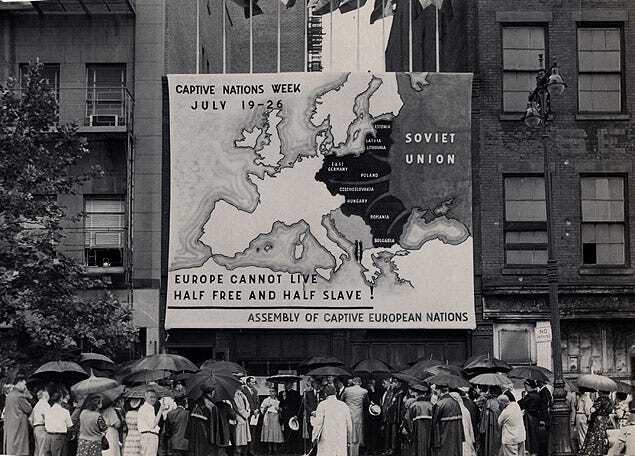The CIA once described the ACEN as “a propaganda organization and a lobby.” VOC advisor Zbigniew Brzezinski told Anna Mazurkiewicz, “I believe the initial purpose of the ACEN was to provide political legitimacy for sustaining from outside the internal opposition to communism.”
The Assembly was not packed to the gills with former [Axis] collaborators like the ABN, but then again, according to Christopher Simpson, “The Albanian [Axis] collaborationist Balli Kombetar organization controlled the pivotal ACEN Political Committee for most of the 1950s.”
Hasan Dosti, the former minister of justice in Italian‐controlled Fascist Albania, led the Free Albania Committee, and chaired the Albanian delegation (which included several Balli Kombetar leaders) at the first session of the Assembly of Captive European Nations. Simpson tells us,
It would be a mistake, however, to view the ACEN as a whole as a “Nazi” organization. The influential Czech delegation was controlled by anti‐Nazi (and anti‐Communist) moderate socialists. The Polish delegation consisted in large part of the old wartime Polish government‐in‐exile in London combined with a handful of surviving Polish underground fighters, many of whom had risked their lives in the struggle against Germany. Most of the Hungarian emissaries were indisputably conservative but apparently free of culpability for war crimes, and so on.
The relatively mainstream character of those ACEN groups, including the anti‐Communist and anti‐Nazi credentials of some top ACEN leaders, gave this Captive Nations movement a thoroughly acceptable image in the eyes of the media and the public at large.
[…]
Mazurkiewicz counted 175 meetings that representatives of ACEN had with members of Congress in 1955–1963. According to this historian, “It should be mentioned, however, that during the decade analyzed here, the cases of citing ACEN materials by staunch anti‐Communists in the congress were rather sporadic. For them, this organization was not radical enough.”
The far‐right American Friends of the Anti‐Bolshevik Bloc of Nations, on the other hand, was established a couple years before the ACEN, and outlasted it by many more.
(Emphasis original.)
No surprised that the extreme anticommunists outlasted the moderates.
Events that happened today (July 23):
1884: The Fascist propaganda star, Emil Jannings, was born.
1942: The Axis began Operations Braunschweig and Edelweiss, and simultaneously executed Communist insurgent Nikola Yonkov Vaptsarov.
1943: The Allied destroyers HMS Eclipse and HMS Laforey sunk the Axis submarine Ascianghi in the Mediterranean after she torpedoed the cruiser HMS Newfoundland.
1945: The postbellum legal processes against the Axis politician Philippe Pétain began, inconveniencing him. (An interesting coincidence, too, given his death exactly six years later.)
1950: Shigenori Tōgō, the Empire of Japan’s Minister of Foreign Affairs, expired.
1951: Philippe Pétain dropped dead. Nothing of value was lost.


